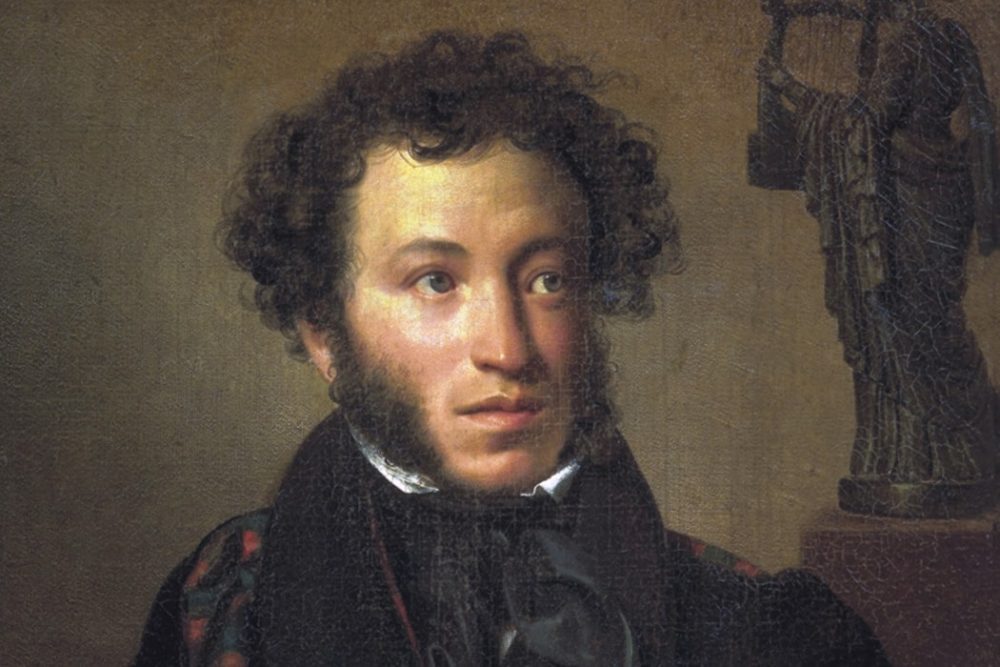Any and all poems can seem daunting to those wishing to dip their toe into the vast and deep waters of poetry. There is so much nervousness and intimidation to feel, and the same questions are asked over and again: Where do I begin? Will I understand it? What am I supposed to feel? Is it beyond me?
Even though I’m a voracious and diverse reader, I still become frozen by poetry. That’s why, until recently, I never attempted to read Alexander Pushkin. This was a mistake. Alexander Pushkin’s poetry is lyrical, beautifully simple, vivid, and endlessly emotive. It can be enjoyed by all readers, regardless of their background in poetry.
And there is now one definitive book of Alexander Pushkin’s poetry, the one book you need to read in order to fully appreciate Alexander Pushkin’s poems: Alexander Pushkin Selected Poetry, translated with complete command and majesty by Antony Wood.

Alexander Pushkin Selected Poetry
Pushkin wrote during what is considered the golden age of Russian poetry (roughly 1800-1830), and since then his works have been broadly considered the very peak of Russian poetic achievement.
He is utterly and completely beloved. And, when approaching the works of a man so revered, it can be daunting knowing where to start reading. When Penguin Classics announced a new collection of Pushkin’s poems in Alexander Pushkin Selected Poetry, I jumped at the chance to get my hands on it and discover the magic of Pushkin for myself.
There’s something clean about picking up a fresh publication rather than digging into an old library of works: it simplifies things, makes them feel shiny and new. And this collection in particular, translated by Antony Wood, makes Pushkin not only exciting and beautiful, but also lays out his poetry in a way that feels like a picturesque walk through the life and works of a genius artist.
This collection is bound together chronologically. It begins with a lengthy and fascinating introduction which tells the story of Pushkin’s life, puts into historical and political context his life and why he wrote, and thoroughly explores his styles of writing.
Pushkin wrote, as this collection includes, lyric poems, narrative poems, and fairy tales. They’re collected here in that order, and within each section is a wide selection of his greatest works.
Alexander Pushkin’s Lyric Poems
The Lyric Poems section of this book presents Alexander Pushkin’s lyric poems in chronological order, beginning with his earliest works at the age of fifteen to his final works during his tumultuous final years (Pushkin was dead before he reached 40).
The section is divided even further into specific periods of his life, each one giving weight and context to his writing. Knowing that he was still a student, or a writer in exile, or a married man, adds welcome clarity and context for readers attempting to understand what he was writing about and why he wrote what he did.
This is part of the reason why Alexander Pushkin Selected Works is such a perfect introduction for readers searching for where to start reading Alexander Pushkin: it provides so much context and detail about his life, and that context is threaded through this chronological collection of his poems.
Whichever poem you read, you know where he was and what state he was in. You can return to the biographical introduction to remind yourself of his situation and ground yourself in each poem. This makes the act of crawling into Pushkin’s head effortless and enjoyable.
Read More: Red Spectres: Russian Gothic Fairytales in Translation
Alexander Pushkin’s Narrative Poems

Beyond his lyric poems, Pushkin also wrote narrative poems. These, I would argue, are his most impressive works – at least, as far as what’s included in this hefty collection. They are stories condensed down into a rhyming and rhythming narrative.
They’re descriptive, mesmerising, and haunting. They utterly transfix the reader, putting them in a meditative state as they read these clear and poignant tales, told with lyrical elegance. At least, that was my experience with them.
Alexander Pushkin’s most famous narrative poem is The Bronze Horseman: A Petersburg Tale. It is the final narrative poem in this section, and it tells the story of Peter the Great. It includes, as do all of the narrative poems and fairy tales, an introductory note by translator Antony Wood, giving context and detail to the narrative.
Each of these introductory notes is around a page in length and adds so much welcome background and perspective to each and every poem. This was especially welcome with The Bronze Horseman since I know shamefully little about Peter the Great, whom Petersburg is named after.
The introduction not only explained to me the ruler’s life but also spelled out Pushkin’s own attitude towards the man, helping me to get into Pushkin’s head before diving into the narrative poem. Reading The Bronze Horseman itself was one of the most pleasant reading experiences I’ve had in a while.
It is a transfixing poem, written and translated with so much vibrance and elegance. It bites and soothes and cradles and inspires. I cannot quite express just how much I adored reading this poem.
Read More: Where to Start Reading Haruki Murakami?
Pushkin in Translation
All of this, this wonderful experience of reading Pushkin’s lyric poems, narrative poems, and fairy tales, was made possible thanks to Antony Wood’s superhuman translations. I don’t know Russian, and I don’t know how much it has shifted and changed over the centuries.
I don’t know if it ages the way English does, or if it remains pure like Icelandic and Mandarin, but Wood, here, has managed to inject his translations with modern sensibilities that offer clarity and sharpness, all the while maintaining a romantic sense of poetic beauty.
Translating poetry must be an enormous challenge, and it’s a skill I respect so deeply. Every poem follows, in English, the same rhyme schemes and rhythmic rules it would have in the original Russian, making us feel confident that none of the magic of reading Alexander Pushkin has been lost in translation.
I spent a single warm and blue April day in the garden reading Alexander Pushkin Selected Poetry, and it’s a day I’ll never forget. It transported me, educated me, warmed and soothed me. It welcomed me into the world of Alexander Pushkin and I am so grateful to Antony Wood for that.
If you’re scratching your head and wondering where to start reading Alexander Pushkin, pick up Alexander Pushkin Selected Poems. It will dispel all fears and worries you might have about exploring the library of one of the world’s most beloved poets.
The way that this book has been organised and structured, and the strength of Wood’s translation, makes for the ultimate Pushkin reading experience.



